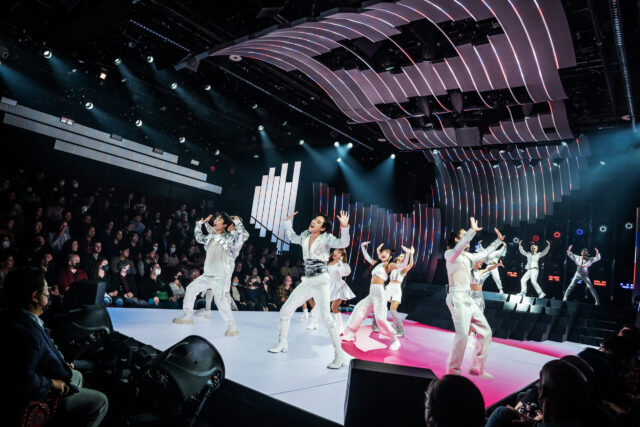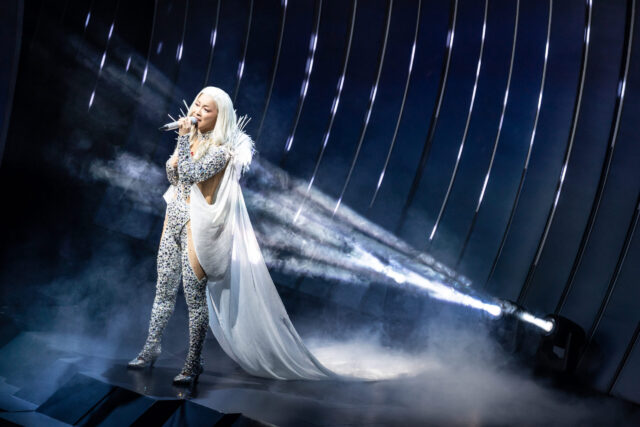
The flashy KPOP is closing early on Broadway (photo by Matthew Murphy & Evan Zimmerman)
KPOP
Circle in the Square Theatre
1633 Broadway at 50th St.
Through December 11
kpopbroadway.com
On Saturday night, December 3, I was at Circle in the Square, watching KPOP. I had loved Ars Nova’s 2017 immersive production at A.R.T./New York and was looking forward to the Broadway incarnation. Alas, lightning did not strike twice.
I was supremely disappointed in the revised book, which eschewed most of the behind-the-scenes drama and the progression of the plot — in the original, small groups of audience members were led through a series of rooms in which the action played out, exploring how K-pop stars are made through vocal and dance lessons, press training, makeup, and costumes, following along as a South Korean record company prepares for its major introduction to the US market. Instead, the new version concentrates on big, glittering production numbers centered around a white filmmaker documenting the rehearsals. The central creative team has not changed — the book is by Jason Kim, with music and lyrics by Helen Park and Max Vernon, music production and arrangements by Park, choreography by Jennifer Weber, and direction by Teddy Bergman. But the feeling has.
While I sat in my seat, missing all the nuance of the original story, the soul of which has been sucked dry, I looked around at the Saturday night crowd, nearly all of whom were having a great time. At Circle in the Square, the audience sits on three sides of the thrust stage, and the lighting is so bright that you can see everyone in the theater. Aside from a few pockets of empty seats in the upper corners, the house was packed, and nearly everyone was eating up every minute of the show; a colleague of mine had a huge smile on his face throughout the two hours and ten minutes (with intermission); he emailed me afterward to say that he “fucking loved” it. (Another colleague of mine said that the night he went, there was an embarrassing amount of empty seats.) People were dancing in their seats, clapping along, eyes sparkling wide at Clint Ramos and Sophia Choi’s dazzling costumes, Jiyoun Chang’s flashy, colorful lighting, Peter Fitzgerald and Andrew Keister’s propulsive sound design, and Peter Nigrini’s constant barrage of cool projections on Gabriel Hainer Evansohn’s set, which includes a mobile platform, video monitors with live footage from multiple angles, and a stage lift with a trap door where a character’s past is explored.
So the last thing I expected was, a few days later, to find out that the show was closing extremely early, on December 11, a mere three weeks after opening, having played forty-four previews and only seventeen performances.
KPOP found itself mired in controversy when Jesse Green used some highly questionable language in his negative New York Times review, leading to the producers of the show and several cast members to take to social media, demanding an apology.

Real-life K-pop star Luna takes center stage at Circle in the Square (photo by Matthew Murphy & Evan Zimmerman)
But was that enough to lead to the surprising closing notice? Plenty of Broadway musicals survive bad reviews and thrive, sometimes for years. Was there not enough interest in K-pop, the music phenomenon that has given rise to such groups as BTS, Blackpink, and Monsta X, who play well-attended concerts around the country? KPOP tries to capitalize on that success, following the fictional girl group RTMIS (pronounced like “Artemis,” featuring its young female stars often posing as if shooting a bow and arrow) and the boy band F8 (“Fate”), a mixed bunch of young men dealing with a new member hogging the spotlight and accused of not being Korean enough. The fictional label’s star, MwE, wants to move away from her highly stylized image and be more real — maybe even become a singer-songwriter (gasp!) — and is portrayed by Luna, an actual Korean pop star who was in the hugely popular troupe f(x).
Even though it’s my job to critique theater, I don’t take pleasure when poorly reviewed shows close, even one that has spurred such nicknames as OKpop, KPOOP, and KFLOP. It might not be to my taste, but a whole lotta people were having a great time the night I was at Circle in the Square, and the audience was far more varied than the usual Broadway crowd, which is a good thing.
I just hope this experience doesn’t sour producers from taking chances on shows that bring a more wide-ranging diversity onstage and in the seats.
I called the original “an awesome journey into music making, promotion, assimilation, the desire for fame, and more,” pointing out, “Early on, Jerry [a marketing expert not in the Broadway production] explains that the mission of his agency ‘is to launch rockets into American markets.’”
Unfortunately, this rocket barely lifted off the ground.